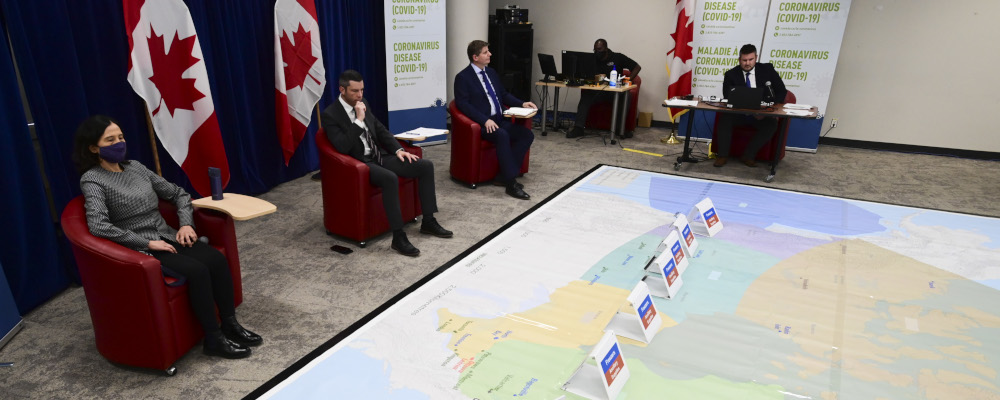Over the coming days, The Hub will publish mandate letters for the incoming cabinet ministers that set out a series of bold policy prescriptions that would cumulatively tilt Canadian politics towards a different and better future.
The best antidote to anger and frustration is aspiration and purpose. The campaign has demonstrated how urgently Canada’s body politic needs such a remedy. There’s no time to waste. It’s time to get to work.
Dear Minister of Health,
I am honoured that you have agreed to serve Canadians as the Minister of Health.
As you know, our government must have a both a short- and long-term orientation. The immediate priority is to help the country through the COVID-19 pandemic and to catalyse a post-pandemic recovery. Getting Canadian businesses and families to the other end of this crisis is the key to restoring stability and optimism in our economy and society.
Beyond that, though, over the long term, we face many opportunities and challenges including geopolitical instability, aging demographics, climate change, reconciliation with Indigenous peoples, long-term fiscal challenges, low productivity, and slow growth.
Each of these issues could easily consume a government’s attention, focus, and resources. But we do not have the luxury of prioritizing one or some of them. They require similar levels of energy and ambition if we are to lay the foundation for a different and better future for Canadians.
An emphasis on the future is a much-needed antidote to the growing anxiety and pessimism in our country. Even before the pandemic, too many Canadians worried that their children will not have the same opportunities and living standards as them. The pandemic has exacerbated these concerns and cast a pall of uncertainty over our economy and society.
In this context, Canadians have grown skeptical of the ability of government to put aside partisan differences or short-term political advantage and make the hard yet necessary choices to mitigate our long-term challenges and accentuate our opportunities. It is incumbent on us to prove to Canadians that their skepticism and doubt is unwarranted. We must rebuild their trust through our actions and choices.
This principle extends to all aspects of governance. Our government must live up to the highest ethical standards, including openness, honesty, and accountability. I expect you to reflect these values in your work. It is critical that we honour Canadians’ trust in us and the history and dignity of the institutions and roles that we occupy.
Our immediate policy priorities flow from the best ideas and rooted in evidence. As the Minister of Health, I would ask that you work with your colleagues to deliver on the following key priorities:
- Conduct a comprehensive review of the Public Health Agency of Canada with the goal of eliminating as much of its programs and operations that are duplicative of provincial public health organizations as possible and instead rationalizing its core activities on the crucial federal function of global pandemic monitoring and control, emergency preparedness planning including pandemic-related research and stockpiling medically-necessary goods and equipment.
- Amend the Canada Health Act to enable provinces and territories to adjust the single-payer model to reduce coverage, on a means-tested basis, for hospital and physician services in exchange for increasing public coverage, in a fiscally-neutral way, for presently non-insured services on behalf of low-income Canadians.
- Clarify that the Canada Health Act permits publicly-funded yet privately-delivered services with parameters in place to ensure fair access and prevent human resource shortages in the public health-care system.
- Work with the minister of finance to reform the Medical Expense Tax Credit to make it refundable, larger and more generous so as to help Canadians without employer-provided health insurance or who are not eligible for current public drug programs to be able to purchase individual private insurance.
- Reform the Canadian Institutes of Health Research’s funding processes to enable more breakthrough-type projects by experimenting with replacing the peer review process with lotteries and prizes in order to eliminate the tendency towards “gatekeeping” and incremental research.
- Work to harmonize various of the department of health’s regulatory processes – from drug approvals to agriculture and agri-food regulatory approvals – so as to accept scientific inputs submitted in other jurisdictional processes and even possibly adopt harmonized decision-making with peer jurisdictions such as the United States.
- Conduct a comprehensive review of the federal department of health to ensure that its activities are not duplicative of provincial and territorial health ministries and instead are focused solely on areas of federal jurisdiction.
I know I can count on you to fulfill these responsibilities and help to deliver a different and better future rooted in prosperity and opportunity for all Canadians.
Recommended for You

‘Our role is to ask uncomfortable questions’: The Full Press on why transgender issues are the third rail of Canadian journalism

Need to Know: Mark Carney’s digital services tax disaster

Theo Argitis: Carney is dismantling Trudeau’s tax legacy. How will he pay for his plan?

Kirk LaPointe: B.C.’s ferry fiasco is a perfectly Canadian controversy




